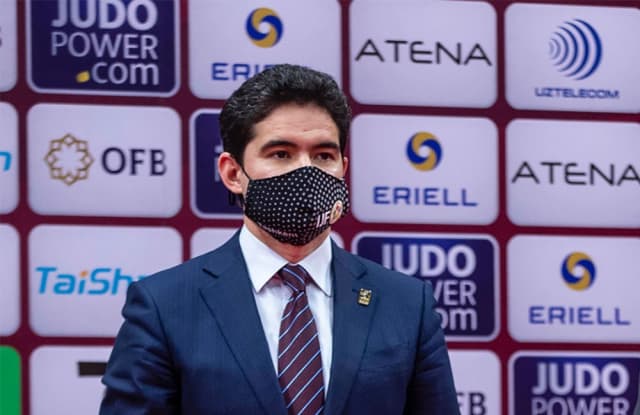On this second day, we met him and asked him what made him smile. "In fact, I'm very excited about what has been happening in Tashkent since the arrival of the first delegations a few days ago. At the same time though, I'm a bit worried, naturally, because I really want everyone to make the most of the event and have a great experience.
This worry is very positive; it motivates, you know. We had to work a lot to organise this grand slam and it is a perfect rehearsal for the organisation of the World Championships in 2022. These days what matters to me is that all judo fans are happy and satisfied. The Uzbek people expect results and medals, that's normal. We do everything to satisfy them and to satisfy all participants, although the number of places on the podium is limited."
Prior to this year, Uzbekistan was organising an annual grand prix, which became a grand slam in 2021, "It's an additional challenge because the prerequisites are higher, but I think that overall we have done a good job. Our team was already used to the grand prix. In the end, it's not so different, even if it puts a little more pressure on everyone. Added to this were the obvious constraints related to the health situation, but once again I think I can say the challenge has been met and met well."

For months now, due to the global pandemic, a lot of activity has been put on hold in Uzbekistan. "The Tashkent Grand Slam is the first major international event to be held in the country and we were pleased to have received government clearance. We were really committed to scrupulously following the IJF Covid protocol. It has been an important guide throughout the preparation phase and now execution phase. With the support of the government and the President Mr. Shavkat Mirziyoyev, the Ministry, the National Olympic Committee and of our partners and of course with the unfailing support of the IJF, we were able to face all the difficulties and today the grand slam is a real success.You know, for months people were really getting a little bored. Seeing a sporting competition and judo in particular is a relief for many."
Uzbekistan has been a country where judo has perfectly taken root, growing year on year, President Kamilov has no intention of resting. "For some time now we have had a new coach, Ilias Iliadis. With his help we are building a new system for the future, not only here in Tashkent, but throughout the country. Historically we have always had a very strong men's team. Today we are also working on the development of women's system. It seems important and necessary to us to build a strong women's team, particularly in the framework of the Paris 2024 Games."
The development of judo in Uzbekistan is not limited to high performance, "We are working hand in hand with the Ministry of Education and we are in the process of increasing the capacity of our school judo programme from 20 to 40 schools. In the twelve regions of Uzbekistan, we are also considering the construction of a lightly structured sports centre by region, to accommodate even more young people and interest them in the practice of our sport. My goal, as President of this great federation, is to place Uzbek judo in the top 3 nations in the world within 5 years."
These goals will require and extensive programme for the Uzbekistan Judo Federation. There is no doubt, though, that with such motivation and with the ability to organise events on the scale of the grand slam, anything is possible.


